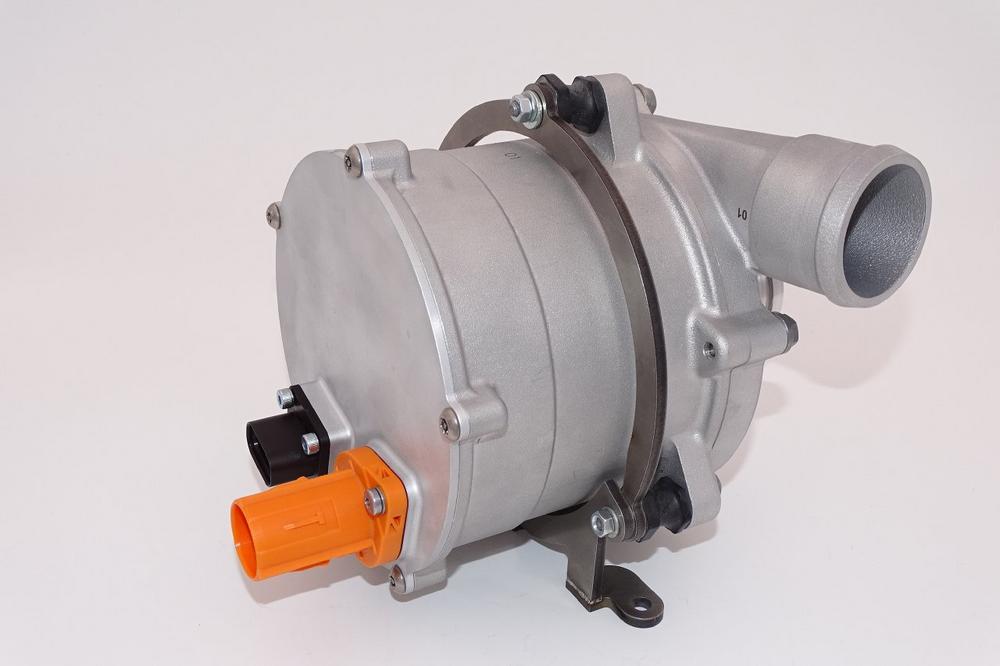The control valve, MPV (Multi Purpose Valve) for short, has a particularly compact package with low weight and is suitable for use on the cathode side of the fuel cell. It is resistant to de-ionized water and hydrogen and allows proportional and precise control. It combines low leakage with a high flow rate and low pressure loss at the same time. The valve operates as an air diverting or bypass valve for the air compressor or can be used as a pressure control valve as well as an isolation valve or shut-off valve for the fuel cell stack.
In addition to the proven pumps for 12 to 48 volts which have been in series production for a long time, coolant pumps have now been specially developed for fuel-cell applications, which are suitable for 400 volts or alternatively for up to 800 volts. These high-voltage coolant pumps are driven by a brushless EC motor with sensorless control. They are equipped with LIN / CAN bus communication and corresponding diagnostic functions. The pumps are rated for up to 2.2 kilowatts. They are suitable for use with de-ionized water and various coolants.
High hydrogen tightness due to new recirculation blower
Fuel cell systems have a recirculation system for unused hydrogen on the anode side. An active blower is often used for this purpose, which must function safely and efficiently even at high concentrations of hydrogen. To ensure this, Pierburg has developed a hydrogen recirculation blower (HRB) based on a side-channel blower and without dynamic sealing elements to ensure ultimate hydrogen tightness over lifetime. The hydrogen recirculation blower is available in both high- and low-voltage variants. The blower can start from cold and has excellent NVH characteristics. It has a rating of 0.7 to 2 kilowatts or up to 400 watts in the low-voltage version. It is driven by a brushless motor with sensorless control; LIN / CAN bus communication and diagnostic functions are also available.
Background information: The importance of the fuel cell
Fuel-cell technology is currently gaining new importance for many vehicle manufacturers. After much investment in the development of this technology since the nineties and its inability to establish itself in the market, the time seems to have come for the fuel cell to gain acceptance as part of the sustainable trend towards electrification. It combines long ranges with short refueling times and is therefore an important addition to purely battery electric vehicles. Meanwhile, some manufacturers have launched vehicles with fuel cells, and other OEMs in Asia and Europe are announcing the series launch of this technology over the next few years. In many regions of the world, including Germany, this is accompanied by the progressive expansion of the hydrogen filling station network propelled by comprehensive public funding.
So far, the focus of fuel-cell vehicle development has been on medium-sized passenger cars, but it is currently shifting towards larger passenger cars and SUVs, even extending to trucks and buses. Equipping such heavy vehicles with batteries for acceptable travel ranges will remain uneconomical for the foreseeable future due to the cost of the battery, its weight and the space required installing it. For those types of vehicles the fuel cell appears to be particularly preferable, because it is also a more economical solution.
Rheinmetall Automotive AG
Karl-Schmidt-Straße 2-8
74172 Neckarsulm
Telefon: +49 (7132) 33-3140
Telefax: +49 (7132) 33-3150
http://www.rheinmetall-automotive.com
Pressereferentin
Telefon: +49 (7132) 33-3142
Fax: +49 (7132) 3352140
E-Mail: Manuela.Schall@de.rheinmetall.com
![]()
